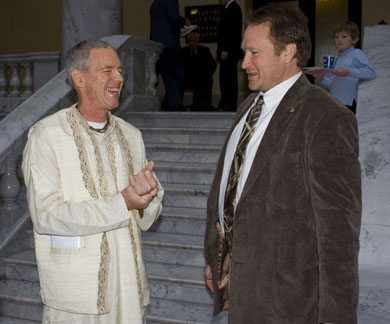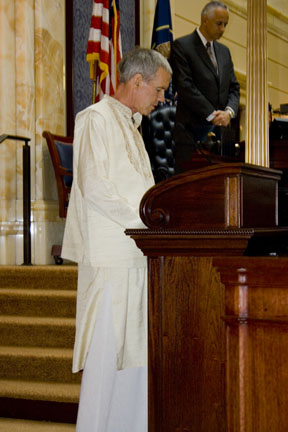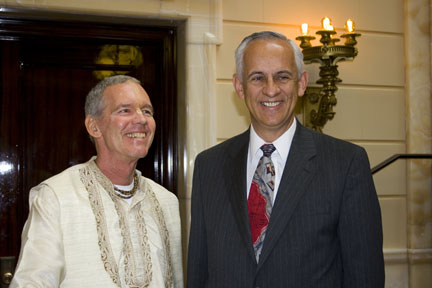Fotos de Prabhavati Devi Dasi del álbum Ananda

"Dandavats" - 7 new articles
Caru Das gives the opening prayer for the Utah State Senate
I was requested by State Senator Mark Madsen to deliver the opening prayer for the Utah State Senate in the capitol building in Salt Lake City. Senator Madsen & his family have been to festivals at the temple on several occasions & enjoyed them all. • Email to a friend • Article Search • Related • View comments • Track comments •  • • Caru Das gives the opening prayer for the 935 Views / EMail This Post / Print This Post / Home » Caru Das gives the opening prayer for the Utah State Senate |
Myth Creation Begun
 •
•Myth Creation Begun
691 Views / EMail This Post / Print This Post / Home » Myth Creation BegunComments • [comment feed]
Interesting points.
I have heard also that a kind of hagiography has developed around other ISKCON spiritual leaders who have passed away. One would think that their wonderful deeds and words would be enough to earn them the respect of all, without actually inventing stories that are contradicted by reliable eye witnesses.
Or on the other hand, is it better to just let people glorify devotees however they are inspired to do so, as long as their motives are pure?
We should never falsely criticize a devotee (and we can all agree that TKG has been unfairly criticized and vilified by many), but is there really much harm in ignoring some possibly excessive praise?
I guess one harm would be, if we do create “mythology” about the lives and deaths of our spiritual leaders, this may create suspicion and doubt (in the minds of many) about the authenticity and historical accuracy of the stories about other saints we read about in Caitanya Caritamrta and Srimad Bhagavatam, or in stories we hear about those who are universally recognized as saints within our tradition (e.g., Narottama Das Thakur, Syamananda Pandit, Baladeva Vidyabhusana, Jagannatha Das Babaji, etc.)
So, maybe we should insist on being hard-nosed historians when making such inquiries. Who is this doctor who opined that TKG left his body before the crash? On what data did he base such opinions?
As for “ecclesiastical convention” and the process of canonization, I guess I am not as disestablishmentarian as Nrsimhananda. (Technically, the word relates to churches as organs of
I mean, we have to have some means of deciding whose appearance and disappearance days to celebrate and fast on, who is mentioned in the BBT Calendar, etc. I do not see what is wrong with a group of senior devotees conferring and deciding these issues as ISKCON policy, when and if the need arises. We just hope they decide correctly.
We may not personally agree with all such decisions, but I hope our most enlightened leaders generally will agree about such things. If our process really works, I would expect the steady, senior, sincere practitioners to generally agree.
At any rate, Srila Prabhupada seems to have vested the authority for such decision-making for ISKCON in the GBC. It doesn’t bother me if there is a “formal” process, but I want it to be an accurate process.
By having a formal process, the Catholics really have a serious inquiry into, for example, the miracles that were supposedly performed by their saints.
Similarly, if we have a formal process (not necessarily using the methods and criteria of the
We could inquire in detail (for example) about the basis for the doctor’s opinion that TKG actually left his body before the crash. We could also inquire from those who were in the car and survived the crash whether TKG had showed signs of having left his body before the crash, and see how their observations tally with the doctor’s.
Even if TKG apparently left his body due to injuries from a car accident, that does not take anything away from the enormous service he did in ISKCON, or on Srila Prabhupada’s great affection for him and trust in his abilities, or on his magnificent exposition of
[I am eagerly awaiting the imminent publication of his doctoral work at Oxford. Is it published yet?]
I did not hear Bhakti Caru Swami’s class about TK Goswami’s disappearance. I did watch the class about H.H. Bhakti Tirtha Swami on Mayapur TV and loved it!
But the idea of “guru” or “saint” by ecclesiastical convention is one we have to look at and thoroughly discuss.
If one can really give Krishna’s instructions to a disciple, intact, and train the disciple in the authentic ways of bhakti, he or she is a “guru”, whether officially recognized as such by any official church or government, or anyone else.
Conversely, if one distorts the teachings of Krishna or cannot actually train a disciple in how to perform His devotional service, he or she is not a “guru”, even if officially (or privately) recognized as such.
This is quite apart from the consideration of whether ISKCON should continue the process of regulating who may serve as initiating guru in ISKCON. It is an entirely different point. ISKCON may have reasons for requesting a devotee who may otherwise be qualified not to perform that function (of serving as initiating guru in ISKCON), and ISKCON may give devotees a chance to perform that function even though they ultimately prove unworthy (Srila Prabhupada himself gave devotees a chance who later fell down).
It is not that having a group of devotees decide something is less reliable than just letting everyone come to their own conclusion.
But there may be danger in how we enforce such decisions.
There is a danger that lurks in large, powerful organizations, yet we want ISKCON to be a large and powerful organization. We just need to avoid the dangers.
When a big organization, whether state, church, school or corporation, has an official policy of honoring and respecting someone, there is a great danger of inauthentic feelings, of coerced and phony respect, and of backlash by “rebels” who feel they are being intimidated to be untrue to themselves and to God (their higher selves).
We see this a lot in government. A king is supposed to be a representative of God. Any authority is. A father, a teacher, a platoon commander, should be obeyed. Why? Because God should be obeyed, and we show our obedience to God by how we obey those He has appointed as our authorities.
In many societies a king is even considered an incarnation of God (as in
Therefore to organize politics it often becomes expedient to create a God-like status of a state leader, whether or not the leader is worthy. George Washington notably resisted this pressure to become super human, but a strain of public worship of Washington is still there in American nationalist sentiment, in spite of its running counter to the ideals of the American revolution.
There was a religious cult accepting Maximilien Robespierre as “Prophet of the last days, herald of the New Dawn,” which, whether or not he actually encouraged it (a debated point), figured in his downfall. Napoleon succeeded in being accepted as a God-like figure.
Tyrants like
Sometimes I think that the intense, even pathological hatred and hostility we see from some of ISKCON’s detractors springs from this kind of dynamic. They felt, whether rightly or wrongly, that they were being officially forced to worship unworthy men, against their conscience. It still seems weird to me, though.
We remember Jayananda Prabhu on the Vaishnava calendar. Perhaps days can be added to remember similar powerful contributors to the Sankirtan Movement as well who have now passed away. Although I personally am not inspired by TKG, having many painful and unpleasant experiences in relationship to him, I can at the same time understand that others might feel inspired by him and his service, and wish to remember him.
Was this article written by ITV Nrsimhananda das, ACBSP, or some other Nrsimhananda das? Thank you.
Your humble servant
Dhira Nitai das
The crux of the issue is that Bhakti Caru Maharaja refers to Tamal Krsna Maharaja and Bhakti Tirtha Maharaja as eternal associates of Srila Prabhupada saying “Just as he came from the spiritual sky these devotees also came from the spiritual sky.”
In effect Bhakti Caru Maharaja is stating here that Bhakti Tirtha Maharaja and Tamal Krsna Maharaja, like Srila Prabhupada, are nitya siddha associates of Caitanya Mahaprabhu. Quite a bold proclamation!
Srila Prabhupada did say that in the ultimate issue there is no difference between nitya siddha and sadhana siddha, as liberated is liberated. However, even if one believes that Bhakti Tirtha Maharaja and Tamal Krsna Maharaja were truly perfected souls it remains imperative to maintain the distinction between such devotees and great saints and acharyas in our line like Jagganatha dasa babaji and Rasikananda.
Indeed the theology of Gaudiya Vaisnavism is dependent on maintaining a distinction between accomplished devotees like TKG and BTS and the parishads or direct associates of Mahaprabhu such as Svarupa Damodhar and the Goswamis.
In other words, the literature of the parsadas of Mahaprabhu is the foundation of Gaudiya Vaisnavism; while the dissertation of Tamal Krsna Maharaj, and the Spiritual Warrior series of Bhakti Tirtha Maharaja, though they may be insightful, are not exactly scripture.
Respectfully, Brahma Das (ACBSP)
Sri Sri Chota Radha Kalachandji are returning to Dallas
 •
• Sri Sri Chota Radha Kalachandji are returning to Dallas
521 Views / EMail This Post / Print This Post / Home » Sri Sri Chota Radha Kalachandji are returning to Dallas 
Nrtya Kisori Dasi: Their Lordships Sri Sri Chota Radha Kalachandji are returning to Dallas after 31 years! We are having a welcoming festival for Them on March 7th, 2010 and wish to invite all the devotees!
Please see the attached file!
Thank you very much.
Your servant, Nrtya Kisori Dasi
Malati dd hospitalized
 •
•Deity installation on Goura Purnima at Murari Sevaka Feb.28th 2010
Murari Sevaka: Deity installation on Goura Purnima at Murari Sevaka Feb.28th 2010. Support this once in a lifetime festival!
 •
•Maha Kumbha, Haridwar - 2010 starts with Srila Prabhupada's bath
Lakshman (das) Vrindavan (IN): Maha Kumbha mela-2010 at Haridwar has been started with millions of people devoted to mother Ganga and followers of our great Indian Vedic culture. It has inaugurated with the first bathing of saintly persons called naga swami.
 •
•More Recent Articles
Click here to safely unsubscribe now from "Dandavats" or change your subscription or subscribe
Unsubscribe from all current and future newsletters powered by FeedBlitz
| Your requested content delivery powered by FeedBlitz, LLC, 9 Thoreau Way, Sudbury, MA 01776, USA. +1.978.776.9498 |
Página PRINCIPAL
OBRAS y AUTORES CLÁSICOS
Agradecimientos
Cuadro General
Disculpen las Molestias









 By Caru Das
By Caru Das One of the photos is of Caru Das and Senator Madsen laughing on the stairs of the Senate, another of Caru Das side by side with Senate President
One of the photos is of Caru Das and Senator Madsen laughing on the stairs of the Senate, another of Caru Das side by side with Senate President  “Let us together be protected and let us together be nourished by God’s blessings. Let us together join our mental forces in strength for the benefit of humanity. Let our efforts at learning be luminous and filled with joy, and endowed with the force of purpose. Let us never be poisoned with the seeds of hatred for anyone. Let there be peace and serenity in all the worlds.”
“Let us together be protected and let us together be nourished by God’s blessings. Let us together join our mental forces in strength for the benefit of humanity. Let our efforts at learning be luminous and filled with joy, and endowed with the force of purpose. Let us never be poisoned with the seeds of hatred for anyone. Let there be peace and serenity in all the worlds.” Today, in this hall, are assembled the elected representatives of the people of this State. They are ready to perform their duties. Lord, please guide them in their thoughts and actions so they can achieve the greatest good for all.
Today, in this hall, are assembled the elected representatives of the people of this State. They are ready to perform their duties. Lord, please guide them in their thoughts and actions so they can achieve the greatest good for all.  Nrsimhananda das (ACBSP): Canonization (or canonisation) is the act by which a particular Christian church or group declares a deceased person to be a saint and is included in the canon, or list, of recognized saints. Originally, individuals were recognized as saints without any formal process.
Nrsimhananda das (ACBSP): Canonization (or canonisation) is the act by which a particular Christian church or group declares a deceased person to be a saint and is included in the canon, or list, of recognized saints. Originally, individuals were recognized as saints without any formal process.
Comments • [comment feed]
This is great! I appreciate this. Hare Krishna! Could we extend this to more senates please?I feel it’s high time conditioned souls are made aware fo the glories of Bhagawan.